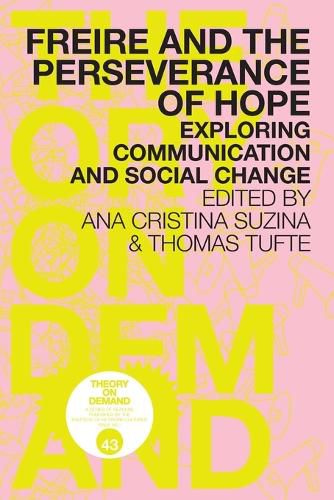Readings Newsletter
Become a Readings Member to make your shopping experience even easier.
Sign in or sign up for free!
You’re not far away from qualifying for FREE standard shipping within Australia
You’ve qualified for FREE standard shipping within Australia
The cart is loading…






This title is printed to order. This book may have been self-published. If so, we cannot guarantee the quality of the content. In the main most books will have gone through the editing process however some may not. We therefore suggest that you be aware of this before ordering this book. If in doubt check either the author or publisher’s details as we are unable to accept any returns unless they are faulty. Please contact us if you have any questions.
The Brazilian educator Paulo Freire (1921-1997) is one of the most important thinkers of the 21st Century, figuring among the most quoted authors in the fields of Education and Social Sciences all over the world. He is also a core reference to an infinite number of grassroots and activist initiatives globally. This book celebrates his birth centennial with a collection of 19 contributions from both experienced and young media and communication scholars and activists working in 11 countries. They reflect and debate Freire’s principles and ideas, revisiting their origins and interrogating their relevance to current challenges and struggles. The result can be summarized as a claim for affect as the core feature of social change and a tool for yielding resistance. I welcome this book as an excellent resource for introducing my students to key Freirean notions such as the reality that activist knowledge has to emerge from the lived experiences of local communities. - Clemencia Rodriguez, Temple University Freire’s ideas offer directions to redress rampant instrumentalism in and of design, instrumentalism evident in the ways in which design is implicated in the design of digital communication products, services, infrastructures, and institutions. - Sharon Prendeville, Loughborough University This volume highlights the centrality of Freirean ideas at the core of communications for social change. - Pradip Thomas, University of Queensland The book is a testament to the potentiality of Freire’s five human-centered ontological principles in guiding pro-social transformation through the iterative process of action and reflection. - Lauren Dyll, University of KwaZulu-Natal
$9.00 standard shipping within Australia
FREE standard shipping within Australia for orders over $100.00
Express & International shipping calculated at checkout
This title is printed to order. This book may have been self-published. If so, we cannot guarantee the quality of the content. In the main most books will have gone through the editing process however some may not. We therefore suggest that you be aware of this before ordering this book. If in doubt check either the author or publisher’s details as we are unable to accept any returns unless they are faulty. Please contact us if you have any questions.
The Brazilian educator Paulo Freire (1921-1997) is one of the most important thinkers of the 21st Century, figuring among the most quoted authors in the fields of Education and Social Sciences all over the world. He is also a core reference to an infinite number of grassroots and activist initiatives globally. This book celebrates his birth centennial with a collection of 19 contributions from both experienced and young media and communication scholars and activists working in 11 countries. They reflect and debate Freire’s principles and ideas, revisiting their origins and interrogating their relevance to current challenges and struggles. The result can be summarized as a claim for affect as the core feature of social change and a tool for yielding resistance. I welcome this book as an excellent resource for introducing my students to key Freirean notions such as the reality that activist knowledge has to emerge from the lived experiences of local communities. - Clemencia Rodriguez, Temple University Freire’s ideas offer directions to redress rampant instrumentalism in and of design, instrumentalism evident in the ways in which design is implicated in the design of digital communication products, services, infrastructures, and institutions. - Sharon Prendeville, Loughborough University This volume highlights the centrality of Freirean ideas at the core of communications for social change. - Pradip Thomas, University of Queensland The book is a testament to the potentiality of Freire’s five human-centered ontological principles in guiding pro-social transformation through the iterative process of action and reflection. - Lauren Dyll, University of KwaZulu-Natal